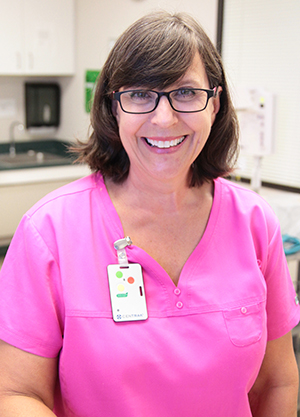Do I need to follow a specific diet while breastfeeding?
Nutrition, Women's Care
Telfair BirthPlace lactation consultant suggests what to add and what to avoid for a healthy diet while breastfeeding
A lot has changed with breastfeeding since our moms fed us and their mothers before. Not all the “rules” that were once associated with breastfeeding still apply.
You don’t need to add hundreds of extra calories to your diet to breastfeed. Nor, is it necessary to have a glass of water every time you nurse.
 “We used to heavily stress diet and say you have to drink water at this time or add so many extra calories in order to breastfeed, but the latest evidence-based practices show that even moms of poor health who cannot provide the right nutrition for themselves can successfully breastfeed,” says Marybeth Milton, RNC, IBCLC, R-LC, lactation consultant with the Telfair BirthPlace at St. Joseph’s/Candler.
“We used to heavily stress diet and say you have to drink water at this time or add so many extra calories in order to breastfeed, but the latest evidence-based practices show that even moms of poor health who cannot provide the right nutrition for themselves can successfully breastfeed,” says Marybeth Milton, RNC, IBCLC, R-LC, lactation consultant with the Telfair BirthPlace at St. Joseph’s/Candler.
“When you are breastfeeding, your body’s No. 1 priority is to make that milk, so all the good nutrients go to that milk first,” Milton continues. “Baby is still going to thrive, even if mom doesn’t have a healthy diet.”
That’s still not an excuse to eat nothing but hot dogs, chips and soda. It’s important for mom to be healthy to sustain breastfeeding and not impact her health in the long run. For example, if mom doesn’t get any calcium through her diet or vitamins, she may start to lose calcium in her bones to supplement enough for breast milk. That can lead to brittle bones and osteoporosis in the future.
Related Article: What are the benefits to breastfeeding?
So a new, general rule of thumb that Milton recommends is to eat to hunger and drink to thirst with a healthy, balanced diet.
Here are some suggestions for a healthy diet while breastfeeding:
Include:
- Lean proteins
- Fresh fruits and vegetables
- Dairy products
- Oatmeal and flaxseeds, such as Mother’s Milk Tea or lactation cookies (Note: There’s no data that supports lactation cookies increase milk production, but there’s no harm in them as long as you don’t eat too many. The store-bought kind can be expensive, so Milton advises women to try to make their own.)
- Plenty of water
- Prenatal vitamins
Related Article: Should expecting mothers take prenatal vitamins?
“All moms have to eat extra for breastfeeding is half a sandwich and a glass of milk. It doesn’t have to be a sandwich and milk specifically, but that gives you an idea of how few extra calories to add to your diet.”
Avoid:
- Foods with a lot of additives and preservatives
- Sugary drinks, which are just hollow calories for both mom and baby
- Caffeine – the way caffeine stimulates us, can also stimulate baby and make them irritable and sleepless, Milton says. Most professionals recommend just a small amount of caffeine, approximately one cup of coffee a day.
- Alcohol – If they choose, moms can moderately drink while breastfeeding, but they need to plan for it, Milton says. Feed baby first and then have one beer, one glass of wine or one small mixed drink. Then, wait two hours before feeding again. If you choose to drink more than one portion and feel like you need to feed baby or pump right away, use milk from your freezer reserves instead.
- High-mercury fish, such as mackerel, swordfish and shark
- Certain medications, such as Sudafed, which can dry up the milk supply. Check with your physician or call the Telfair BirthPlace Breastfeeding WarmLine at 912-819-8231 for help with medications.
Related Article: Can I eat fish while I’m pregnant? A nutritionist and physician explain.
“The same way that you eat while you are pregnant, that’s the same way you’d eat while you are breastfeeding,” Milton says. “Aim for a well-rounded diet.”
Related Article: Understanding a pregnancy diet and proper weight gain
Milton also advises that breastfeeding is not the time to try to lose weight. Moms that choose to breastfeed and not add many extra calories may naturally lose weight because breastfeeding burns calories.
“Because the body is designed to breastfeed, mom is going to use that extra fat she stored during pregnancy to make that fat for milk and that helps her drop weight sooner than if she didn’t breastfeed,” Milton says. “This is not the time to diet. You want to focus on a healthy diet and not a weight-reduction diet. Once mom stops breastfeeding, then she can focus on weight loss.”
If you have questions about breastfeeding, call the Telfair BirthPlace Breastfeeding WarmLine. Callers can speak to a board-certified lactation consultant for breastfeeding assistance or make an appointment for a consultation.
For expecting moms, St. Joseph’s/Candler also offers a monthly breastfeeding class. Click here for more details.